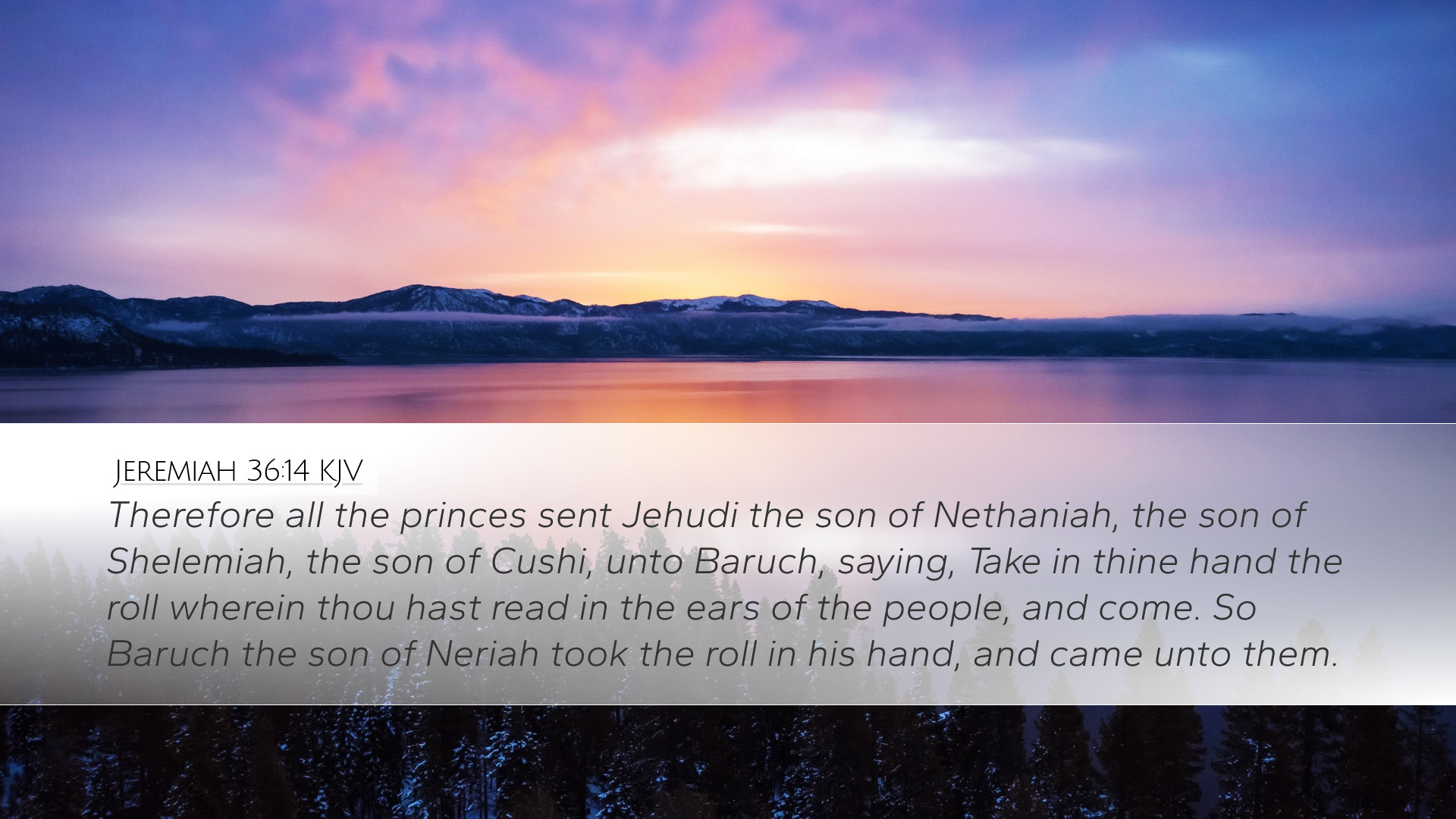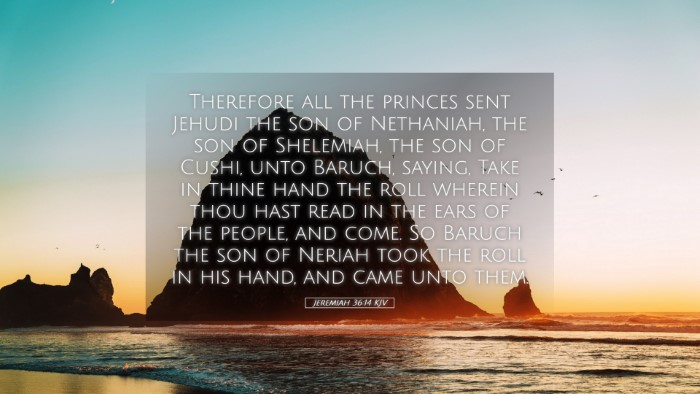Commentary on Jeremiah 36:14
Contextual Overview: Jeremiah 36 presents a significant moment during the prophetic ministry of Jeremiah, as it details the writing and public reading of a scroll containing his prophecies. This event occurs during a time of great turmoil in Judah, characterized by impending judgment and calls for repentance.
Jeremiah 36:14 - The Intriguing Response
The verse states: "Therefore all the princes sent Jehudi unto Nebuchadnezzar, saying, ‘Go, take the scroll, and read it aloud to us.’” This moment captures a critical transition in the hearts of the leaders of Judah.
Insights from Matthew Henry
Matthew Henry emphasizes the weight of the moment when the princes, who earlier exhibited defiance against Jeremiah's warnings, are now compelled to seek out his words. Henry suggests that this reflects a crucial turning point in their perceived authority. He notes:
- The leaders realized the urgency to heed the prophetic messages as they faced the Babylonian threat.
- This request to read the scroll symbolizes a flicker of repentance—albeit provisional—as they confront the reality of their situation.
Henry reminds the reader that such moments often reveal the hearts of those in power, who might vacillate between pride and humility. Their calling for the scroll reflects a desperation born from the looming judgment rather than true repentance.
Insights from Albert Barnes
Albert Barnes offers a deeper look at the reactions of the princes, highlighting their previous refusal to listen to Jeremiah's warnings. He elaborates on how:
- The princes’ request for the scroll embodies a critical acknowledgment of their own failures.
- This demonstrates a significant shift from obstinacy to an attempt to engage with divine counsel.
Barnes also points out the implications of their actions concerning the power dynamics at play. He states that their newfound curiosity about Jeremiah’s message indicates a recognition that spiritual truth persists regardless of their previous disregard.
Insights from Adam Clarke
Adam Clarke focuses on the socio-political backdrop affecting the leaders' actions. Clarke argues that:
- The stress of impending doom from the Babylonian conflict catalyzed a need to reflect upon the messages of the prophet.
- There is an underlying irony in their request; having previously ridiculed the message, they now seek it desperately.
Clarke notes that Jeremiah's scroll could not be ignored any longer as the repercussions of ignoring prophecies were becoming increasingly tangible. Clarke calls attention to the fact that the leaders’ motives were likely mixture of fear and pragmatism rather than genuine faith.
Theological Implications
This verse and its surrounding passages catalyze contexts for various theological discussions, such as:
- The Nature of Prophetic Authority: The tension between the message and the messenger is a recurring theme in prophetic literature. Here, the princes’ engagement with the scroll indicates an acknowledgment of Jeremiah's divinely appointed authority.
- The Dynamics of Repentance: The urgency of the situation led to a form of repentance that seeks wisdom, even when not fully genuine. This invites discussions on the nature of repentance and its authenticity.
- Scripture as a Guide in Crisis: The obvious need of the leaders during a crisis reflects the necessity for guidance provided through Scripture, underscoring its enduring relevance.
Application for Today's Believers
For contemporary pastors, theologians, and students, this passage encourages several reflections:
- Response to Divine Warning: Reflect on how one responds to prophetic voices in their life. Are there instances of ignoring warnings that later necessitate a humbled seeking for truth?
- Authenticity in Repentance: Encourage introspection on the authenticity of one’s repentance. Are we willing to seek God’s truth sincerely even when circumstances compel us?
- Utilization of Scripture: Emphasize the critical need for engaging with Scripture as a resource for wisdom, especially in tumultuous times.
Conclusion
Jeremiah 36:14 represents a poignant moment of reflection and potential transformation among the leaders of Judah. The insights drawn from the commentaries of Henry, Barnes, and Clarke serve as rich resources for understanding the complexities of prophetic engagement. They demonstrate the misguided leadership faces the dire need for wisdom found only in the voice of God, reinforcing the truth that Scripture holds ultimate authority over the hearts of leaders and, consequently, the lives of believers.


